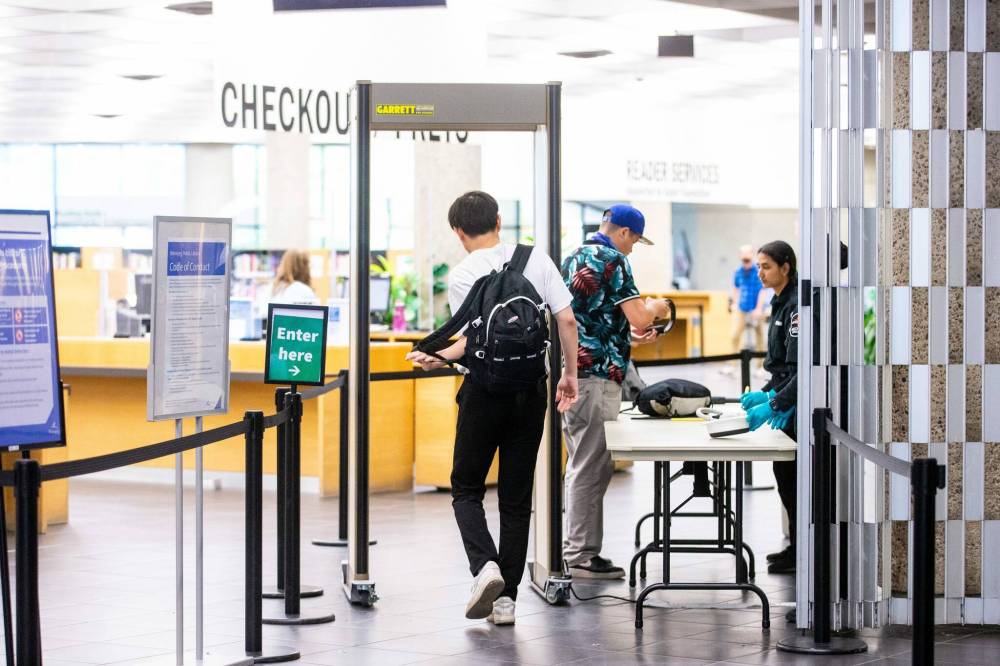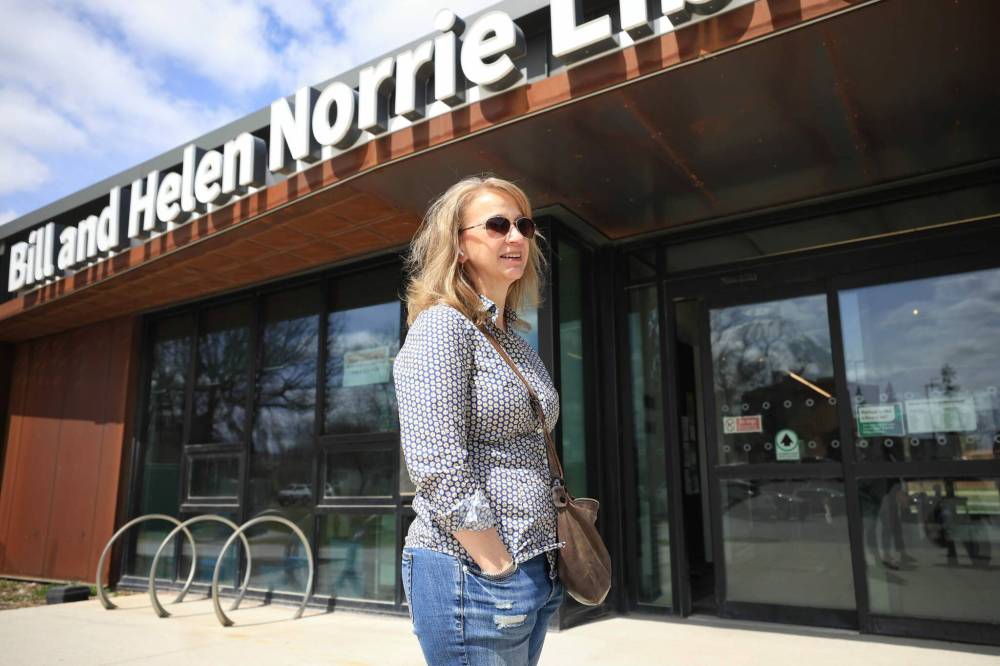City of Winnipeg security costs jump in response to violence, threats
Read this article for free:
or
Already have an account? Log in here »
To continue reading, please subscribe:
Monthly Digital Subscription
$0 for the first 4 weeks*
- Enjoy unlimited reading on winnipegfreepress.com
- Read the E-Edition, our digital replica newspaper
- Access News Break, our award-winning app
- Play interactive puzzles
*No charge for 4 weeks then price increases to the regular rate of $19.00 plus GST every four weeks. Offer available to new and qualified returning subscribers only. Cancel any time.
Monthly Digital Subscription
$4.75/week*
- Enjoy unlimited reading on winnipegfreepress.com
- Read the E-Edition, our digital replica newspaper
- Access News Break, our award-winning app
- Play interactive puzzles
*Billed as $19 plus GST every four weeks. Cancel any time.
To continue reading, please subscribe:
Add Free Press access to your Brandon Sun subscription for only an additional
$1 for the first 4 weeks*
*Your next subscription payment will increase by $1.00 and you will be charged $16.99 plus GST for four weeks. After four weeks, your payment will increase to $23.99 plus GST every four weeks.
Read unlimited articles for free today:
or
Already have an account? Log in here »
Hey there, time traveller!
This article was published 02/05/2025 (232 days ago), so information in it may no longer be current.
The City of Winnipeg’s security-related costs have risen by millions in the last decade, with one department’s spending quadrupling in an effort to provide protection at libraries and the animal services agency.
Within community services, costs that were defined as security-related soared to $826,324 in 2024 from $198,260 in 2015, as per a freedom of information request filed by the Free Press.
The increase is primarily attributed to newer measures, including private security guards, at some libraries and the animal services building at 1057 Logan Ave.
Contracted guards were hired for the lobby and front counter area of the animal services agency, starting in January 2024, in response to several incidents that raised concerns about the safety of staff and visitors.
“This was due to incidents of property damage and inappropriate behaviour occurring at the animal services agency building,” city spokesman Kalen Qually wrote in an email to the Free Press.
Perhaps the most well-known example of security being heightened at a city facility is the downtown Millennium Library. Airport-style security checks were introduced at the entrance after a fatal stabbing in December 2022. Contracted guards were assigned to other library branches as needed.
MIKAELA MACKENZIE / FREE PRESS FILES Airport-style security checks were introduced at the entrance of the Millennial Library following a 2022 incident.
“We’ve seen security costs increase across North America over the past decade, for all levels of government and the private sector as well,” Mayor Scott Gillingham said in a statement.
“Locally, the province has increased security at the legislative building, and the city has stepped up measures at our libraries and other public buildings like city hall.”
He cited a vehicle-ramming attack that killed 11 people at a Vancouver festival last weekend, and an alleged terror attack inside Edmonton’s city hall in 2024 as reminders of “why those investments are necessary.”
The Free Press requested annual security expenses for city facilities, excluding police and fire paramedic sites.
The city provided the total expenses within the defined security accounts of seven areas — community services and animal services; campus; parking; planning, property and development; municipal accommodations; fleet; and transit.
The totals do not capture the full picture of the city’s security- or safety-related costs.
Data for some departments were incomplete. It was not clear whether the totals include items such as salaries for guards at city hall, or the community safety officer team, whose tasks include patrolling the Winnipeg Transit system. The team’s costs were projected to rise to $3 million annually by 2027.
The freedom of information request found the way the city records security expenses is not uniform. Some costs were recorded in a different category.
For example, security glass is recorded under building expenses, rather than security expenses, the city said in response to the request.
Each department manages the way expenses are recorded.
Expenses for the public works and water and waste departments were not available because their security costs are embedded with other costs, the city said.
JESSICA LEE / FREE PRESS FILES Brandon Trask, associate professor with the University of Manitoba’s Faculty of Law, says it is incumbent on the city to find efficient ways to provide security and protection.
Brandon Trask, an associate professor of law at the University of Manitoba, said the city doesn’t seem to have an accurate understanding of what it spends on public safety generally.
“This should be concerning to residents, given that the city has proceeded with massive tax, rate and fee increases this year — and given that Winnipeg already spends more on policing, as a share of the municipal operating budget, than any other major city in Canada,” he said.
Trask said it is incumbent on the city to find efficient ways to provide security and protection.
For the figures that were available, expenses within the seven departments’ defined security accounts climbed to almost $3 million in 2024 from $1 million in 2015.
The city said expenses related to individual facilities were not available because data are not stored in a way that can be sorted per facility.
Winnipeg resident Michelle Milani said security increases at some public buildings speak to the state of the city and issues such as crime. She welcomed the measures.
“I want to be safe in these buildings, and the people who work there have to be safe,” she said outside the Bill and Helen Norrie Library at 15 Poseidon Bay, where there was no visible security presence.
The level of security at a public facility, if needed, may vary by neighbourhood, Milani noted.
RUTH BONNEVILLE / FREE PRESS Michelle Milani says she welcomes the measures. 
Library user Fern Swedlove said she hopes the problems that necessitate security measures are temporary.
“I’m hoping that it improves with all the different initiatives for social services,” she said.
Ken Campbell, another library user, said it’s sad that some facilities require security.
“When I was a boy growing up in Winnipeg, there wasn’t any. Nobody even thought about it,” he said.
A fourth person who spoke to the Free Press pointed to the increasing use of private security guards or special duty police officers in retail stores or supermarkets.
For municipalities, the default position was always to try to be as open as possible, and to provide access to politicians and public servants, said Toronto security consultant Andrew Kirsch, a former intelligence officer with the Canadian Security Intelligence Service.
In recent years, more municipalities have added or upped security measures at city halls, libraries or other facilities in response to actual violence or threats, or the potential for incidents, he said.
“Anyone with the responsibility for publicly accessible spaces — municipal governments, especially — have this very challenging dual duty of care, which is to provide an open, welcoming, accessible space for people who use the services, and also to provide the safety and security for the visitors and guests, and people who work there,” Kirsch said.
Some situations are linked to social issues or protests, while some people feel more comfortable threatening public figures or public servants than in the past, he noted.
“Ever since COVID, really… we have seen many government facilities or public spaces having to reassess if their security posture is still appropriate for the elevation in threats they are facing,” Kirsch said.
chris.kitching@freepress.mb.ca

Chris Kitching is a general assignment reporter at the Free Press. He began his newspaper career in 2001, with stops in Winnipeg, Toronto and London, England, along the way. After returning to Winnipeg, he joined the Free Press in 2021, and now covers a little bit of everything for the newspaper. Read more about Chris.
Every piece of reporting Chris produces is reviewed by an editing team before it is posted online or published in print — part of the Free Press‘s tradition, since 1872, of producing reliable independent journalism. Read more about Free Press’s history and mandate, and learn how our newsroom operates.
Our newsroom depends on a growing audience of readers to power our journalism. If you are not a paid reader, please consider becoming a subscriber.
Our newsroom depends on its audience of readers to power our journalism. Thank you for your support.
History
Updated on Monday, May 5, 2025 11:52 AM CDT: Corrects typo


